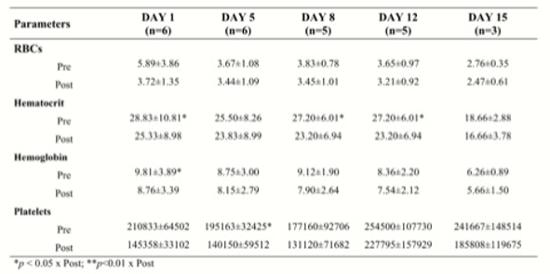Hematological Profile of Dogs with Chronic Kidney Disease Stage 3 Undergoing Intermittent Hemodialysis
Department of Veterinary Clinics, School of Veterinary Medicine and Animal Science, São Paulo State University (UNESP), Botucatu, Brazil
Introduction
Chronic kidney disease (CKD) is a common disease diagnosed in small animal practice. CKD is characterized to be a progressive and functional changes in the renal parenchyma, which may ultimately progress to renal failure. Intermittent hemodialysis (IHD) is an extracorporeal renal replacement therapy that involves relatively shorter periods of hemodialysis sessions.
Objectives
This study aimed to evaluate the hematological profile of dogs with CKD stage 3 which underwent to intermittent hemodialysis.
Methods
The study randomly assigned 6 dogs previously diagnosed with CKD stage 3. Dogs were of both genders, different ages and breeds. All dogs underwent to IHD twice a week for 15 days. Blood samples were collected before and after treatment and they have received clinical, laboratorial, and physical daily evaluations.
Results
Red blood cells, hematocrit, and hemoglobin were lower in POST samples from all tested days (Table 1). Also, there were sharp declines in red blood cells, hematocrit, and hemoglobin values due to blood loss during dialysis. Blood loss is commonly reported in animals which underwent to the IHD treatment. Blood loss can occur either from the remaining loss in the lines or due to hemolysis along the circuit. Thrombocytopenia was also reported at the end of the hemodialysis sessions with an. Thrombocytopenia is a common adverse reaction observed in patients receiving heparin therapy which results from blood contact with the dialysis membrane.
| Table 1. Hemodialysis group (HDG) | 
|
|
| |
Conclusions
We highly recommend a hematological monitoring of dogs with CKD along with the prescription of IHD to avoid coagulation disorders and the progression of anemia.